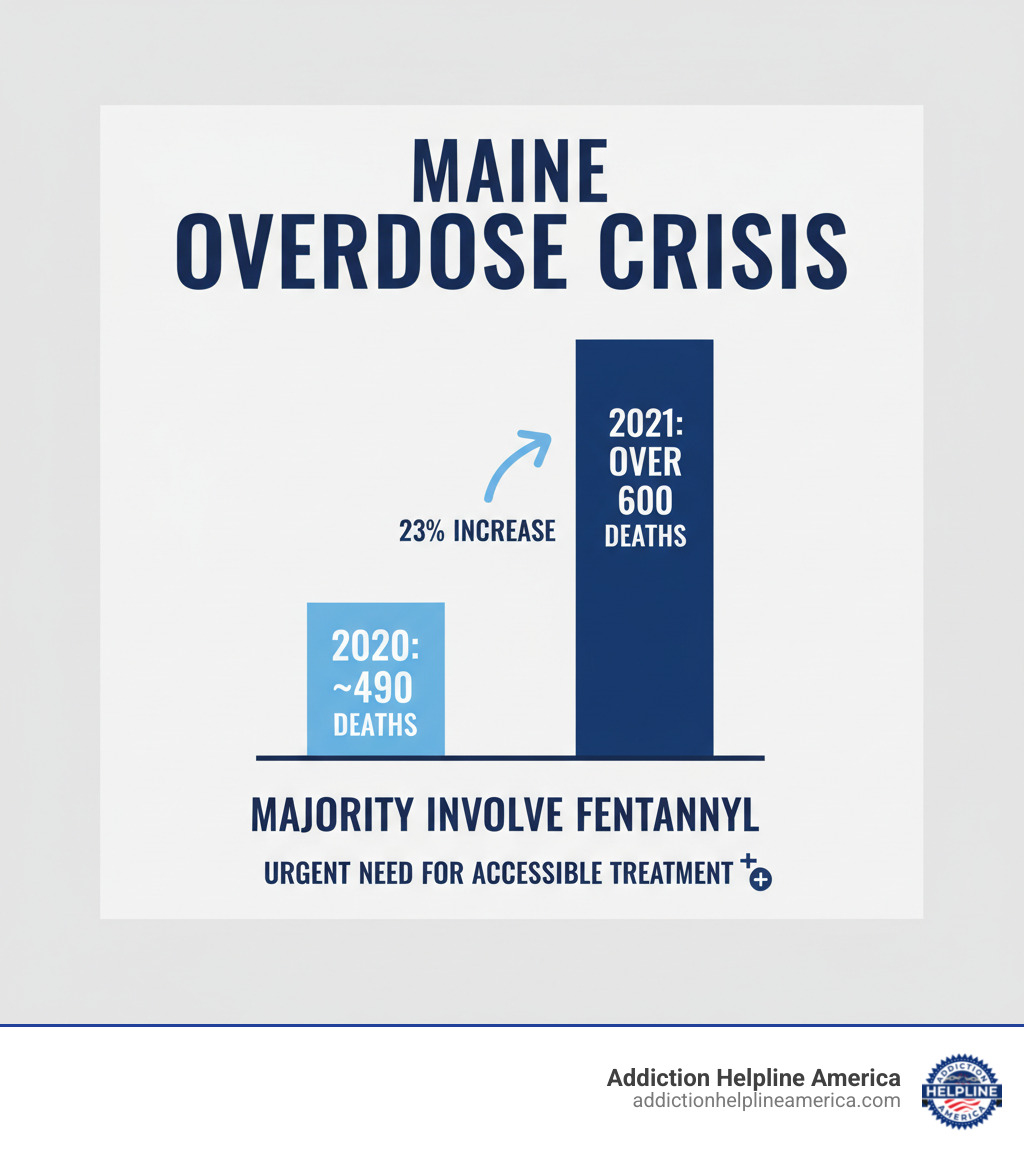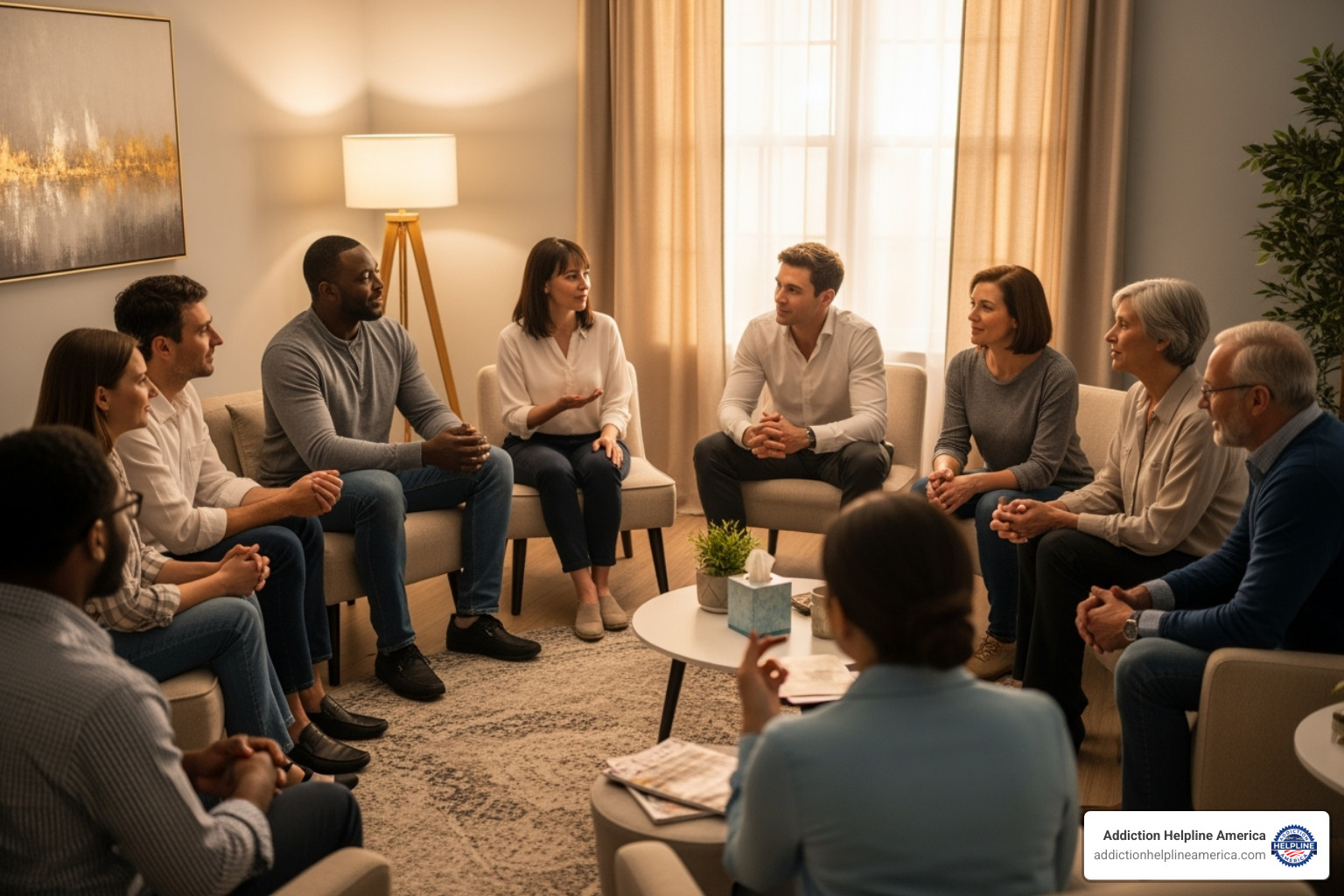
Why Maine Addiction Treatment Matters Now More Than Ever
Maine’s stunning natural beauty stands in stark contrast to a growing substance use crisis. In 2021, the state reported over 600 drug overdose deaths—a 23% increase from the previous year, largely driven by synthetic opioids like fentanyl. This epidemic affects communities from Portland to the most rural towns, making access to care more critical than ever.
Maine addiction treatment offers a lifeline. A wide range of services is available, including medically supervised detox, residential and outpatient programs, medication-assisted treatment (MAT), and peer-led recovery centers. Despite the challenges, there is hope. Maine has expanded its network of providers and harm reduction services, creating more pathways to recovery.
Understanding these options is the first step. At Addiction Helpline America, we provide confidential, 24/7 guidance to connect you with the right Maine addiction treatment resources. Our team understands the unique challenges Mainers face and can help you find the appropriate care for yourself or a loved one.
Understanding the Landscape of Addiction in Maine
Beneath Maine’s peaceful surface, thousands of residents are battling substance use disorder. This struggle affects people in every community, from Portland to the smallest rural towns. Navigating the state’s resources, coordinated by the Office of Behavioral Health, can feel overwhelming in a crisis.
At Addiction Helpline America, we cut through the confusion to find the right Maine addiction treatment for you. For those near Portland, our dedicated page on Maine addiction treatment in Portland offers localized resources.
The Opioid Crisis and Its Impact
Maine is one of the states hit hardest by the opioid crisis. In 2021, over 600 people died from drug overdoses—a 23% jump from 2020. The primary driver is fentanyl, a powerful synthetic opioid often mixed into other street drugs without the user’s knowledge. While Portland has felt this crisis acutely, its reach extends into every corner of the state. In response, Maine is expanding treatment programs and life-saving strategies. Explore the services available at substance use disorder related services in Maine.
Common Challenges for Mainers
Many Mainers face significant barriers to getting help. Understanding these is the first step to overcoming them.
- Geography: In rural Maine, the nearest treatment center can be hours away, a major hurdle for those with limited transportation or time off work.
- Waitlists: After finding the courage to call, being told there’s a weeks-long wait for detox or residential care can be devastating.
- Cost: Concerns about co-pays, deductibles, or the lack of insurance prevent many from seeking care. Addiction often creates financial instability, which in turn blocks access to treatment.
- Co-Occurring Disorders: Many people struggle with mental health issues like depression or anxiety alongside addiction. Finding integrated treatment that addresses both is crucial but can be difficult.
- Stigma: The fear of judgment from family, employers, and the community keeps many people suffering in silence.
We help people steer these barriers every day. Learn more about your options at Maine addiction treatment options.
How Maine’s Approach is Evolving
Maine is adopting smarter, more compassionate strategies to fight addiction. The state has acceptd harm reduction, a practical approach focused on keeping people alive and healthy until they are ready for recovery. This includes making naloxone widely available to reverse overdoses, providing clean syringes to prevent disease, and offering fentanyl test strips.
Maine is also expanding its network of recovery community centers, which offer peer support and coaching in a non-clinical setting. Another key innovation is drug treatment courts, which combine judicial oversight with intensive treatment and case management as an alternative to incarceration. This public health-focused approach is encouraging, and you can explore these evolving resources at Maine addiction resources.
A Comprehensive Guide to Maine Addiction Treatment Programs
Effective Maine addiction treatment addresses the physical, emotional, and social aspects of substance use. There is no single path to recovery, which is why Maine offers a full spectrum of care to meet you wherever you are in your journey. Let’s walk through the available options so you can make an informed choice.
Detox and Residential Treatment
For many, recovery begins with medical detoxification. Attempting to withdraw from substances like alcohol, opioids, or benzodiazepines alone can be dangerous. Medical detox provides 24/7 supervision in a safe environment, where professionals manage symptoms with medications to prevent complications and ease discomfort. Even for substances with less severe physical withdrawal, medical support can be crucial for success.
Following detox, many transition to a residential treatment program. This involves living at a facility for 30 to 90 days, removed from daily triggers and stressors. Residential care is ideal for those with significant impairment or who lack a supportive home environment. These programs offer intensive therapy and counseling in a structured setting, giving you the space to focus entirely on recovery. For more details, visit More info about Maine detox and residential treatment.
Outpatient, Intensive Outpatient (IOP), and Partial Hospitalization (PHP)
For those who need flexibility, outpatient options provide strong support while allowing you to maintain daily responsibilities.
- Outpatient Programs (OP): The most flexible option, typically involving weekly therapy sessions while you live at home. It’s ideal for those with a stable support system.
- Intensive Outpatient Programs (IOP): A middle ground offering more structure, with therapy sessions 3-4 days a week. Many step down to IOP after residential treatment.
- Partial Hospitalization Programs (PHP): The most intensive outpatient option, with programming 5 days a week. It provides a level of care similar to residential treatment without the overnight stay.
This continuum of care allows you to move between levels as your needs change.
| Feature | Outpatient (OP) | Intensive Outpatient (IOP) | Residential Treatment |
|---|---|---|---|
| Time Commitment | Low (e.g., 1-2 sessions/week) | Medium (e.g., 9-20 hours/week) | High (24/7 care) |
| Living Situation | Lives at home | Lives at home | Lives at the facility |
| Intensity | Lower, focus on coping skills & relapse prevention | Moderate, structured therapy & group support | High, immersive therapy & constant supervision |
| Ideal Candidate | Stable, strong support, early recovery, step-down | Stable home, strong motivation, step-down, or primary | Unstable, severe SUD, co-occurring disorders, no safe home |
For more information on these options, please visit More info about outpatient treatment in Maine.
Specialized Treatment Options in Maine
Maine addiction treatment also includes specialized approaches to improve long-term success.
Medication-Assisted Treatment (MAT) is a cornerstone of care for opioid and alcohol use disorders. It combines FDA-approved medications like Buprenorphine (Suboxone) and Naltrexone (Vivitrol) with counseling. Buprenorphine reduces opioid cravings and withdrawal, while Naltrexone blocks the effects of opioids and reduces alcohol cravings.
Youth-specific services address the unique challenges of adolescents, incorporating family therapy and educational support. Holistic therapies like mindfulness, yoga, art, and music therapy are also integrated into many programs to heal the mind, body, and spirit. These specialized options reflect a commitment to offering diverse pathways to recovery. To explore these approaches, visit More info about specialized treatment in Maine.
How to Access and Afford Care in Maine
Taking the first step is courageous, but navigating the logistics of Maine addiction treatment can be daunting. We’re here to help you find a provider, understand your financial options, and know where to turn in a crisis.
Finding the Right Treatment Provider
Finding a suitable provider doesn’t have to be a struggle. At Addiction Helpline America, we offer free, confidential guidance to connect you with the right program from our network. Explore our Maine-specific resources at Find a provider through Addiction Helpline America.
State-run tools are also valuable. You can dial 211 Maine or text your zip code to 898-211 for local resource information. Your primary care physician can also be an excellent starting point for a referral.
When considering a provider, ask about the types of treatment they offer, their specialties, their treatment philosophy, program length, and what aftercare planning they provide. Most importantly, confirm their insurance acceptance and any out-of-pocket costs.
Understanding Your Insurance and Payment Options for Maine addiction treatment
Concerns about cost should not prevent you from seeking care. Most major private insurance plans (Aetna, Anthem, Blue Cross Blue Shield, Cigna, Humana, United Healthcare) cover addiction treatment. The specifics of your coverage will depend on your plan.
MaineCare (Maine’s Medicaid program) and Medicare also cover a wide range of addiction services, making treatment accessible. For those without insurance, many facilities offer self-pay options, financing plans, or sliding scale fees based on income.
Our team at Addiction Helpline America can help you steer this. We offer a confidential insurance verification service to provide a detailed breakdown of your coverage, eliminating financial surprises. Start the process at Verify your insurance for Maine addiction treatment.
Crisis Support and Emergency Services
In an acute crisis, immediate help is available. For any life-threatening medical emergency, such as an overdose, always call 911 or go to the nearest emergency department.
For urgent mental health or substance use crises that are not immediately life-threatening, you have options:
- Maine Crisis Line: Call 888-568-1112 for state-specific guidance and connection to local resources.
- 988 Suicide & Crisis Lifeline: Call or text 988 for 24/7 confidential support for emotional distress or a substance use crisis.
Reaching out in a moment of crisis is a critical sign of strength. For more information, visit More info about crisis support in Maine.
Building a Strong Support System for Lasting Recovery
Recovery is a lifelong journey that begins after initial treatment. A strong support system—from peers, family, and community resources—is essential for long-term success. Aftercare planning, community engagement, and family involvement are not extras; they are critical components of lasting recovery.
The Role of Recovery Community Centers
Recovery Community Centers (RCCs) are a unique part of the Maine addiction treatment landscape. These are not clinical facilities but warm, welcoming spaces run by peers with lived experience. They provide authentic connection through recovery coaches, who help you develop personal recovery plans and steer challenges.
RCCs also offer safe, substance-free social environments and accept an “all-pathways” approach, recognizing that recovery looks different for everyone. Maine has expanded its network of RCCs across the state:
- Portland Recovery Community Center in Portland
- Bangor Area Recovery Network in Brewer/Bangor
- REST Center in Lewiston
- Augusta Recovery Reentry Center in Augusta
- Aroostook Recovery Center of Hope in Houlton
- Bath Recovery Community Center in Bath
- Coastal Recovery Community Center in Rockland
- DownEast Recovery Support Centers in Calais and Machias
- Lakes Region Recovery Center in Bridgton
- Larry Labonte Recovery Center in Rumford
- Pir2Peer Recovery Center in Millinocket
- Roads to Recovery Center in Caribou
Find a center near you through our resources at Find a Local Recovery Center.
How Family Members Can Get Involved
Addiction affects the entire family, and recovery can be a family affair. Many Maine addiction treatment programs involve families through therapy and educational workshops. These resources help families understand addiction as a disease, learn healthy communication, and set effective boundaries.
Support groups like Al-Anon and Nar-Anon provide invaluable peer connection for family members, offering a space to share experiences and realize they are not alone. When families heal together, the chances of lasting recovery for their loved one increase dramatically. For more information, visit More info about family support in Maine.
Harm Reduction in the Maine Addiction Treatment Landscape
Harm reduction is a compassionate and practical approach that acknowledges not everyone is ready to stop using substances. Its goal is to keep people alive and reduce harm until they are ready for recovery. This philosophy saves lives and serves as a critical bridge to treatment.
Key harm reduction strategies in Maine include:
- Naloxone (Narcan): This overdose-reversal medication is now widely available to first responders, families, and the public, saving countless lives.
- Syringe Service Programs: These programs provide sterile injection equipment to prevent the spread of HIV and hepatitis C. They also serve as a vital point of contact, building trust and connecting people to care when they are ready.
- Fentanyl Test Strips: These simple strips help people identify the presence of deadly fentanyl in their drugs, preventing accidental overdoses.
By reducing stigma and meeting people where they are, harm reduction complements traditional Maine addiction treatment and creates more pathways to recovery. Learn more at Learn more about your options.
Conclusion
Navigating Maine addiction treatment can feel complex, but you are not alone. Maine is actively fighting its substance use crisis with an expanding network of compassionate care, from medically supervised detox and residential programs to flexible outpatient options and Medication-Assisted Treatment.
Resources are available to help you afford care, and crisis services are ready to respond 24/7. Lasting recovery is supported by a strong community, including peer-led Recovery Community Centers, family involvement, and life-saving harm reduction strategies.
Recovery is possible. The most difficult step is often the first one: asking for help.
That’s where we come in. At Addiction Helpline America, we offer free, confidential, and personalized guidance. We understand Maine’s unique landscape and can connect you with the right program for your needs. We are here to listen without judgment and help you find a path forward.
Your journey to a healthier life can start today. Personalized help is just a phone call away. Find the right Maine rehab program for you.
Our helpline is 100%
free & confidential
If you or someone you care about is struggling with drug or alcohol addiction, we can help you explore your recovery options. Don’t face this challenge alone—seek support from us.
Programs
Resources
Will my insurance
cover addiction
treatment?
We're ready to help
Find the best
drug or alcohol treatment
center
Are you or a loved one struggling with addiction? Call today to speak to a treatment expert.
















